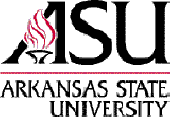|
August 1, 2001
First Year Experience
provides
opportunities for students
The First Year
Experience at Arkansas State University is a program structured to give
new students opportunities and prepare them for life on a university
campus.
The program, which began in fall 1999, is still relatively new to ASU
and continues to enhance the experience of first-time students.
"The First Year Experience is designed to help students in their
transition from high school to college, because the experiences are so
different," Lynita Cooksey, associate vice chancellor of academic
affairs, said. "The First Year sections help students deal with
different social and diversity issues they may not have faced in high
school. We are able to help them once theyíre in this new situation,
and to adjust and adapt to a multi-cultural environment with an extreme
range of social activities."
The First Year Seminar courses are also for non-traditional students
coming to campus, which means the blending of traditional-age students
and non-traditional age students creates a secondary learning
environment.
"Last fall I had some non-traditional students in my section, and I
believe it really helped my traditional students to see everyone has
problems or things they need to manage," Cooksey said. "Many
of the traditional students have concerns such as how to go to school
and pay for a car, while many of the non-traditional students have
concerns about working full-time, raising a family and getting their
education. Traditional students can see how life experiences prepare
them."
Cooksey, a native of Jonesboro, also noted that First Year seminars are
an option for every first-time, full-time student, even students who are
more prepared academically than others.
"We have found that students who score 30 on their ACT benefit from
this as much as students with a 20 on the ACT. Itís not just about
academic preparedness, itís about maturity and life skills."
Each course section varies in content and can be specialized by topic or
interest or general information. Some sections of the seminar target
specific disciplines or interests such as agriculture, business, health
professions or science, while others may focus on current issues such as
politics, trends in technology or diversity. However, each has a common
core that includes academic performance skills, self-management skills
and understanding how a university works.
Academic performance skills discussed in the course include how to
study, take notes, tests and think critically. Students are also taught
how to better utilize the library and other technical resources on
campus.
Time management, priority setting, economic management, emotional
maturity and transitioning are issues covered under the self-management
skills section of the course.
Understanding university policy is an essential section of the core
content, because students can better utilize the services available to
them. This section of the course covers organization, faculty
expectations, resources, policies, degree requirements and advising.
"The purpose of the core information is to better prepare students
for life on campus and life after school. We teach students to calculate
their grade point average, and show them how important their G.P.A. is
and that their transcript is like a fingerprint. We actually show them
an anonymous transcript, so they can see how withdrawing from a class or
failing to do so can affect a transcript or grade. The choices they make
now can follow them their entire life, and all of a sudden the students
realize that everything they do while in school goes with them."
Cooksey noted the importance of informing students of all the services
available to students on campus, such as the health center and pharmacy
or financial aid or academic services, such as tutoring.
Although taking part in the First Year Experience is not mandatory for
students at this time, all incoming student athletes are required to
take a two-hour course, Life Skills for Athletes. The course progresses
over the academic career of the athlete to include information about
NCAA rules, future employment opportunities and money management. The
course is important because it includes the same core content as other
courses, but is geared for students who have a possible future in
professional sports.
Students participating in the First Year Experience may also take part
in Learning Communities, two courses which are linked together and share
a common enrollment of students. The communities allow students enrolled
in the same courses to get to know one another, form natural study
groups, earn better grades and develop a greater sense of belonging and
community within the university, according to Cooksey.
Many upper-level students studying primarily within their major already
experience a sort of learning community because they are in many of the
same courses with their peers. By providing this option to first-time
students, the benefits of working together with other students begins
earlier in their academic career.
Cooksey noted that while the First Year Experience program at Arkansas
State is relatively new, the idea behind it has been used at many other
universities, including the University of South Carolina where a First
Year Experience Center is housed.
"All of this is change, and change is difficult. The seminars are
easier to implement than our Learning Communities because people donít
always realize how they work," Cooksey said.
"Our focus is for the success of our students. As this program
continues and we add to our available sections and learning communities,
I believe we will continue to see our students succeed while adjusting
to life at college."
# # #
|
|

University
Communications Office
Jonesboro, Arkansas
Staff:
Tom Moore
Straley Snipes
Vic Nelson
870-972-3056
fax 870-972-3069
Send mail:
ASUnews@astate.edu
Links:
List
of News/Announcements
Upcoming
Public Events
About
ASU
ASU Home Page
|